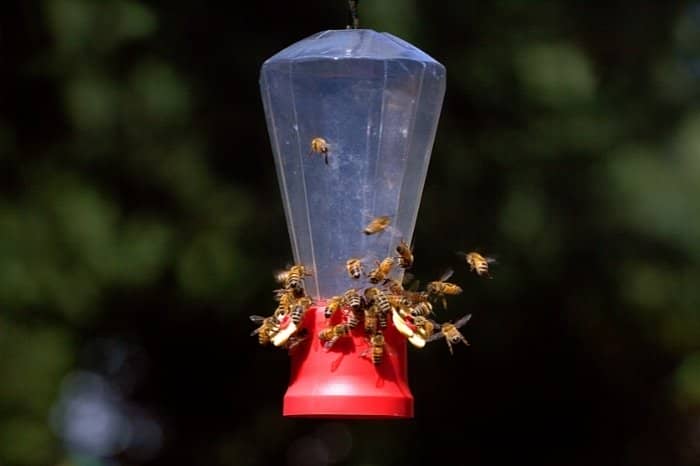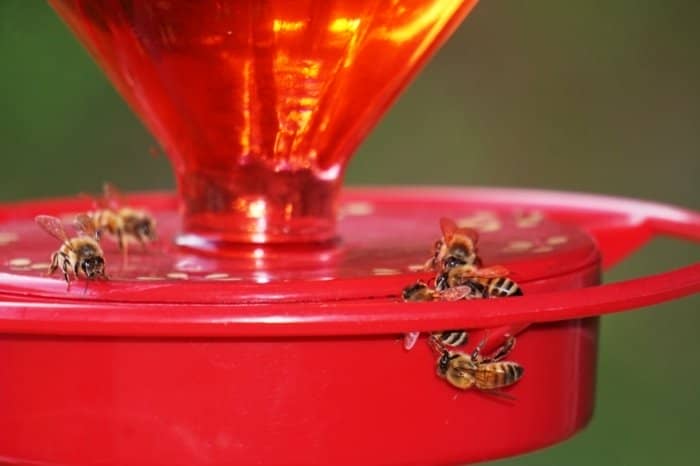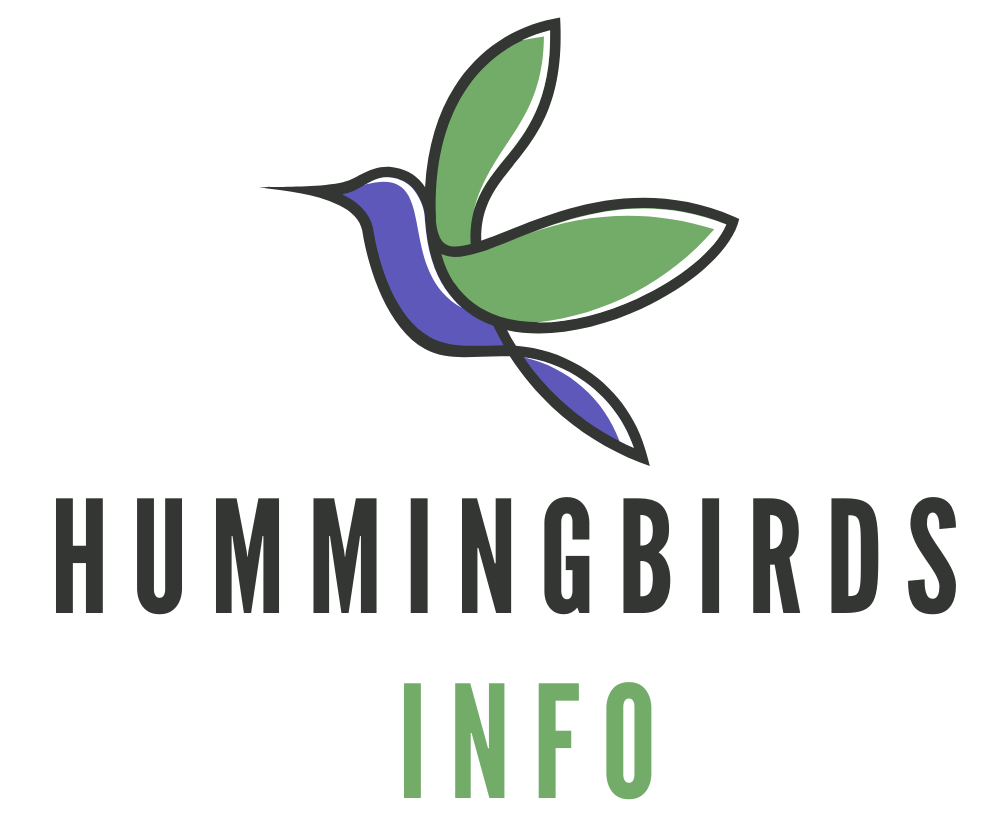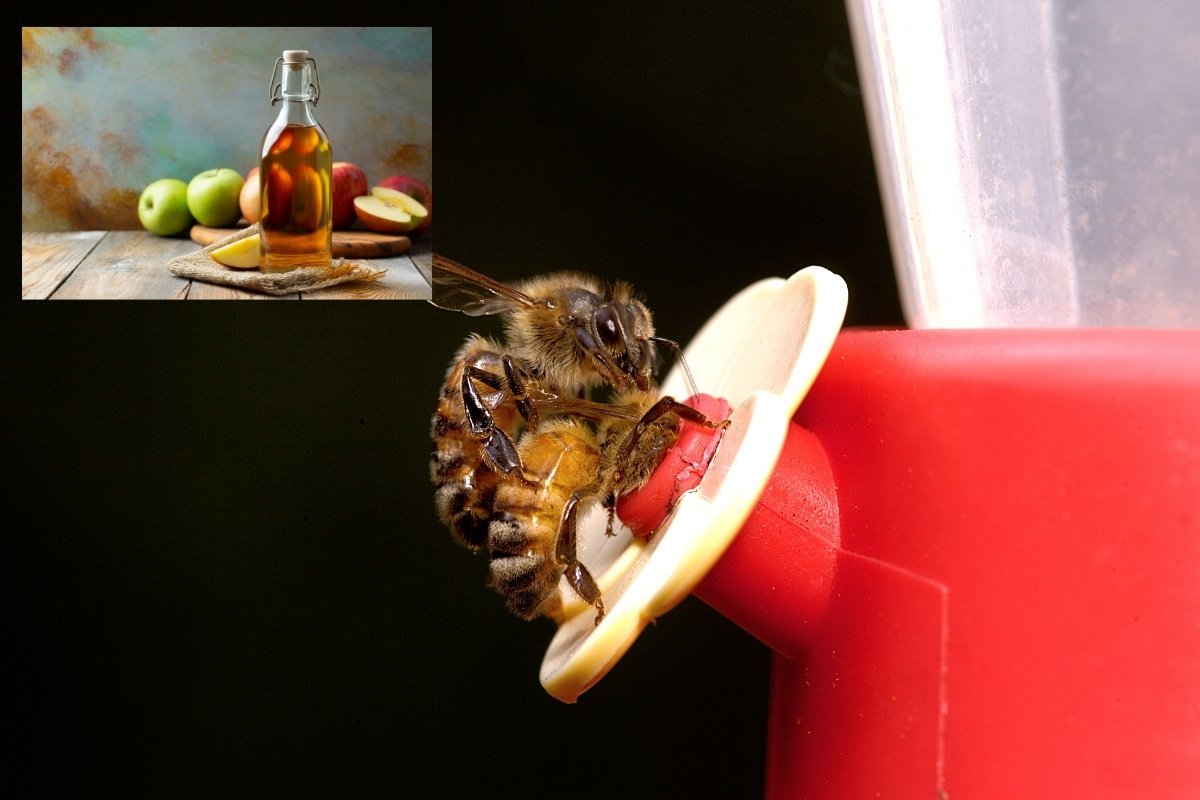Keeping bees away from your hummingbird feeder is a tough job, but before using vinegar, you need to consider does vinegar kill bees? Bees feed on nectar and pollen, which are available at the same spots that hummingbirds feed. In some cases, the bees can smell the nectar or spot the UV reflection from the source.
But the problem arises when they swarm your hummingbird feeder. Hummingbirds might feed along with the bees, but they’re more likely to fight. However, hummingbirds won’t eat bees.
So why do we want to chase off bees? While hummingbirds are territorial and won’t give up their feeding spot so easily, they might avoid a swarmed feeder. Also, a feeder that’s become packed with bees and other insects is prone to contamination, so even if the insects leave, it won’t be safe for drinking.
Hummingbird Feeders And Bees
Hummingbird feeders use either homemade or store-bought nectar. This nectar is safe and nutritious for both hummingbirds and bees. But unlike hummingbirds, bees live in large families called colonies.

Bees have a special movement called the waggle dance, with which they signal the rest of the hive where they found food. As soon as one bee discovers your hummingbird feeder, you can expect more visitors. These smart insects can tell their families where and how far to fly to find the nectar source.
But how do you get rid of bees without harming hummingbirds? Both of these species are important and beneficial. They’re both excellent pollinators, and bees provide us with the tastiest sweetener. So before using leaning into any practice, rethink, does vinegar kill bees?
Read more about 10 Birds That Drink Nectar Besides Hummingbirds
Bee Population Today
The bee population is descending year after year. Compared to 1947, the number of bees today is 40% lower. Due to various pesticides, malpractices in agriculture, pollution, and the destruction of their natural habitats.
But how do you get rid of bees on hummingbird feeders without hurting them? The method is simple, resort to using physical barriers and scents instead of dangerous chemicals.
Why Are Bees Important
Without bees, our whole ecosystem will suffer changes. Bees are responsible for every fruit, vegetable, or nut we eat. They work hard to pollinate flowers, prevent inbreed and increase the crop yield.
Bees pollinate over 90% of the most produced crops. So imagine how their extinction will affect the market and our table. Moreover, some predators feed on bees and honey. Once the bee number lowers, other species will starve.
Mason Bee Revolution: How the Hardest Working Bee Can Save the World
The Dangers Of Vinegar For Bees
Does vinegar kill bees? Yes, vinegar solutions and weed killers with vinegar are deadly to the bees. While them swarming your nectar might not be the best view, using vinegar to deter them is highly unethical and toxic.
The vinegar smell will deter bees from your garden, so many crops won’t get pollinated and might yield smaller batches.
There are more conscious and sustainable ways to chase away bees from a hummingbird feeder that don’t involve killing them. However, it’s best to prevent the bee swarms before they find your feeder.
Check Out What Is The Difference Between Male And Female Hummingbirds?
How Vinegar Kills Bees
Not only does vinegar kill bees, but all forms of vinegar kill all bee species. Apple cider, rice vinegar, and regular alcoholic vinegar have the same effect. Wondering how does vinegar kill bees? People often spray the bees with vinegar, causing the acetic acid to burn the bees. Once they come in contact with vinegar, they’re dizzy, disoriented, and die instantly.
If you wonder how much vinegar does it take to kill bees, the answer is merely a trace amount. People allergic to bees swear by a 1:4 ratio of vinegar and water.
How To Keep Bees Away From Hummingbird Feeder
We answered does vinegar kill bees, but what are some better ways to keep them away? Think of using strong scents and physical barriers. Here are some simple examples.

1. Bee Guards
If you have a store-bought hummingbird feeder look for bee guards. These small additions prevent bees from reaching the nectar and accomodating on your feeder. While they stop the bees, the hummingbirds can still feed due to their long beaks.
Purple, red, violet, yellow and blue are among the colors that attract the most bees. Try to find a feeder in another color so it won’t attract as many bees.
2. Plant More Flowers
Hummingbird feeders are not the bee’s first choice. When there’s a lack of natural nectar, they will forage the feeders to survive. The nectar here is plentiful and easily accessible.
To prevent this, plant more nectar-rich flowers that hummingbirds don’t visit. These are usually tiny flowers like the Basket of Gold or other wildflowers. Plant them away from your usual feeder location.
3. Add Scents
Instead of wondering does vinegar kill bees, use a friendly approach and add lavender, mint, basil, lime, lemon, and citronella around your feeder. A bee’s sense of smell is almost 100 times stronger than a human’s. But hummingbirds have no sense of smell. Adding plants or oils that bees hate won’t chase away the hummingbirds.
Make it even better and plant mint, lavender, and basil around the feeders. Never use oils of any kind on the bees, but put out a diffuser.
Bottom Line: Does Vinegar Kill Bees?
If you’ve heard of people using vinegar to repel bees, you’ve probably wondered is vinegar harmful to bees? Unfortunately, not many gardeners rethink does vinegar kill bees before using it. There are also weedkillers based on vinegar.
If bees are swarming your feeder, remove it, install bee guards, put out some deterring scents around, and watch them fly away.
FAQ’s
[rank_math_rich_snippet id=”s-f5523e54-5a97-4e8b-9b18-66969bc4d81a”]


